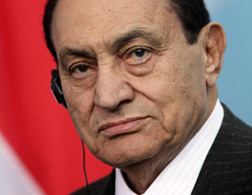Sitting on His Assets
How Switzerland was able to freeze Mubarak's Swiss bank accounts.
Posted Friday, Feb. 11, 2011, at 6:05 PM ET Slate In the protests that led to Egyptian President Hosni Mubarak's ouster, his money was a point of contention for Egyptians. The country's youth suffers from crippling unemployment, with tens of thousands of college graduates unable to find good jobs. Its recent economic gains have failed to produce higher incomes for most Egyptians, with inequality growing worse over the past five years. About 40 percent of the population lives on less than $2 a day.
In the protests that led to Egyptian President Hosni Mubarak's ouster, his money was a point of contention for Egyptians. The country's youth suffers from crippling unemployment, with tens of thousands of college graduates unable to find good jobs. Its recent economic gains have failed to produce higher incomes for most Egyptians, with inequality growing worse over the past five years. About 40 percent of the population lives on less than $2 a day.
But the Mubarak family itself has reportedly made out handsomely. Estimates of its total wealth reach $80 billion. (All these numbers, of course, should be taken with a grain of salt.) Newspapers in Cairo focused on Mubarak's money during the days of protests, and protesters noticed. One chant, reportedly, went: "O Mubarak, tell us where you get $70 billion!"
Due to a recent change in Swiss law, however, if Mubarak has secreted illicit money away in a Swiss bank account, Egyptians just might get some of it back. "I can confirm that Switzerland has frozen possible assets of the former Egyptian president with immediate effect," a foreign ministry spokesperson told Reuters on Friday. The ministry did not say how much money Switzerland froze or give any other details. The change to Swiss law makes it easier for the country to freeze dictators' assets even if their countries are in disarray.
Switzerland has had a long reputation for upholding strict privacy-in-banking laws. As a consequence, its banks have gained a reputation as a good place for dictators to deposit stolen funds. Now, some legal scholars are saying the country is "poised to become an example of one of the most forward-leaning countries in the quest to return stolen assets to developing countries."
In October, the Swiss Parliament passed the Restitution of Illicit Assets Act, which took effect on Feb. 1. Among other things, it allows the Swiss Cabinet to freeze contentious assets even if a country has not formally asked Switzerland to do so. The Swiss Department of Foreign Affairs explains that it found "the inability of the requesting state to provide Switzerland with elements of proof or the necessary judgments" to be a "main problem." The new law, it says, "can henceforth provide a solution."
The foreign ministry devised the law in part because of its experience with "Baby Doc" Duvalier, the Haitian strongman deposed in 1986. Duvalier—who stole millions from Haitians and spent it on lavish parties, foreign homes, and shopping trips—kept some funds in Swiss banks. Now, thanks to the new law, Switzerland intends to repatriate some of Duvalier's stolen money as soon as possible. Switzerland has frozen and hopes to send back about $5.8 million, for use in "programs of public interest aimed at improving the living conditions of the (Haitian) population."
Other dictators have lately found themselves frozen out by the Swiss as well. For instance, the government has frozen the assets of Laurent Gbagbo, the president of Cote d'Ivoire, who lost a November presidential election but has refused to step down. This month, using the new law, Switzerland it also froze the assets of Zine el-Abidine Ben Ali, the disgraced former president of Tunisia, who was deposed last month and has fled to Saudi Arabia.
The country has not said whether Egypt asked Switzerland to freeze Mubarak's money or whether the Swiss did so on their own. Either way, it does not seem likely Mubarak will get the cash back any time soon.


0 Comments:
Post a Comment
<< Home